2023年中考语法时态专项现在完成时态复习课件 (共40张PPT)
文档属性
| 名称 | 2023年中考语法时态专项现在完成时态复习课件 (共40张PPT) |  | |
| 格式 | pptx | ||
| 文件大小 | 5.8MB | ||
| 资源类型 | 教案 | ||
| 版本资源 | 人教新目标(Go for it)版 | ||
| 科目 | 英语 | ||
| 更新时间 | 2023-06-13 20:45:27 | ||
图片预览

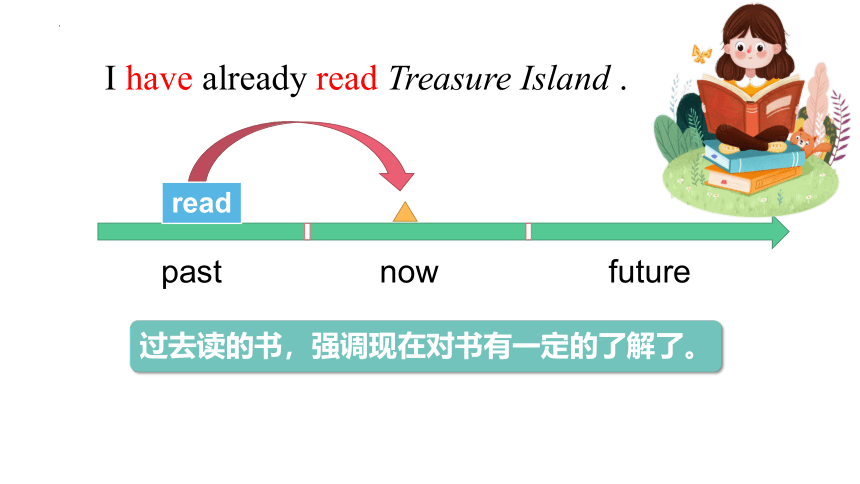
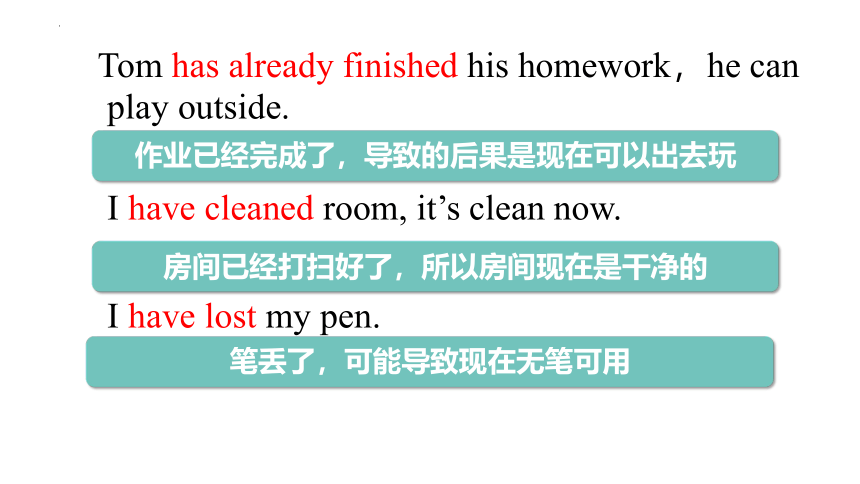
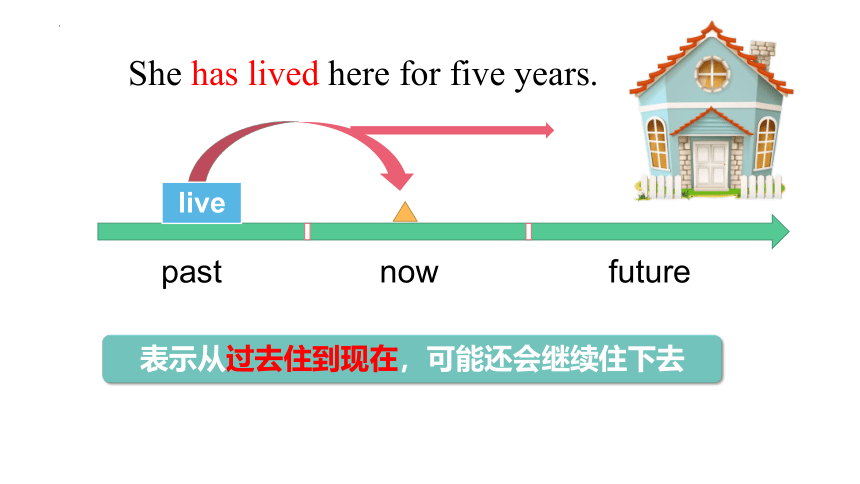
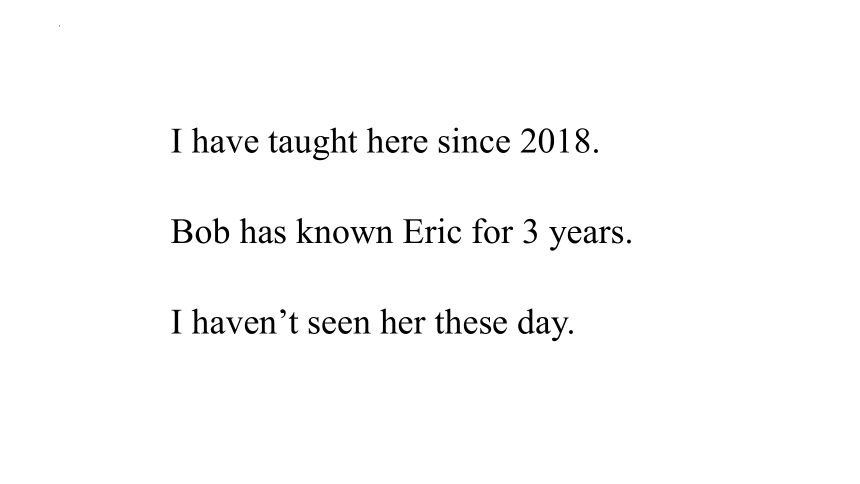
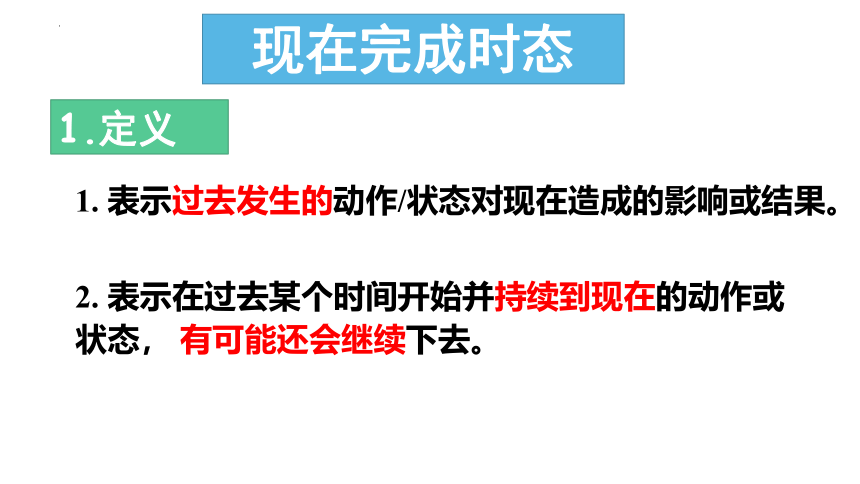
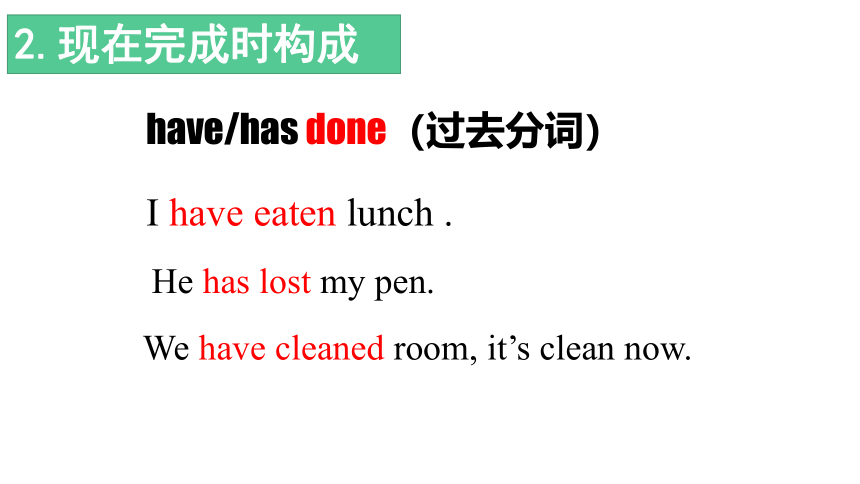
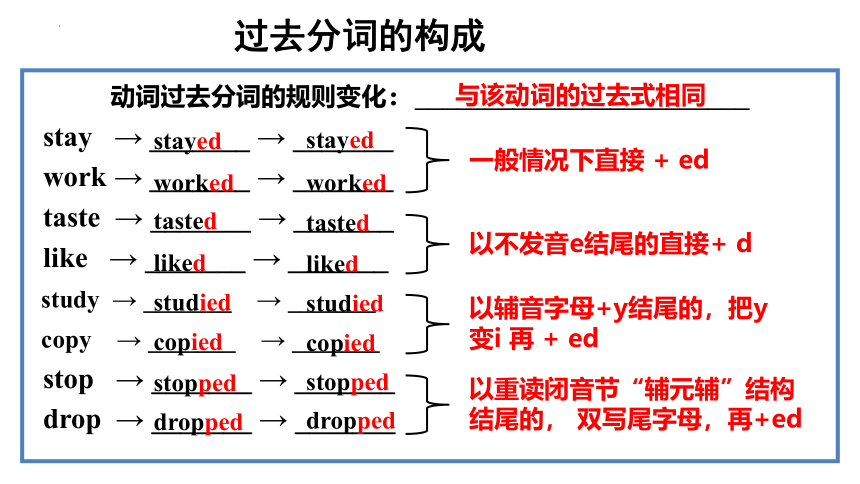
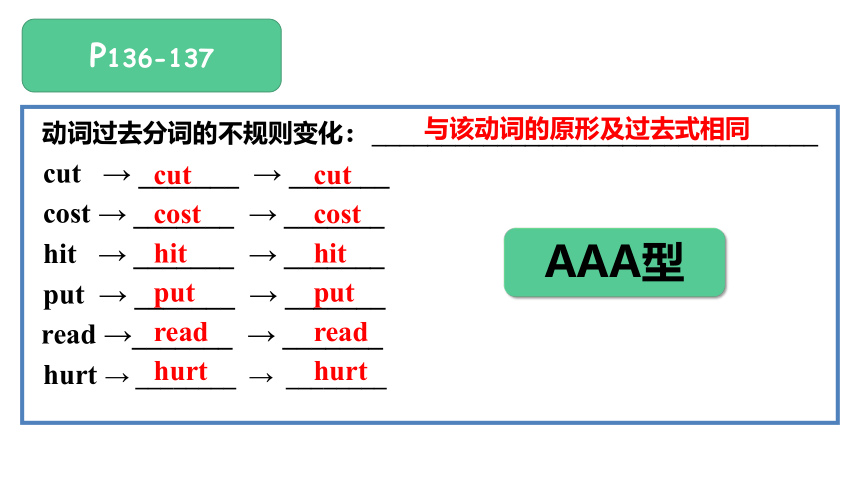
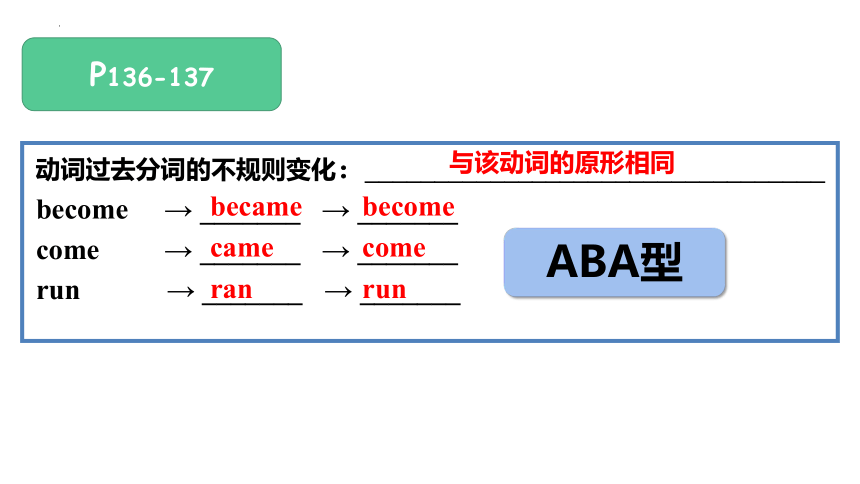

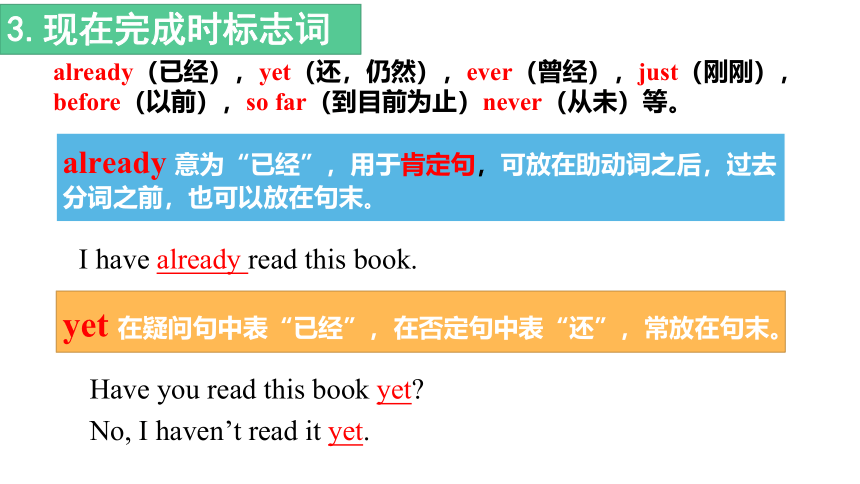
文档简介
(共40张PPT)
Present Perfect Tense
现在完成时态
past
now
future
I have already read Treasure Island .
过去读的书,强调现在对书有一定的了解了。
read
Tom has already finished his homework,he can
play outside.
I have cleaned room, it’s clean now.
I have lost my pen.
作业已经完成了,导致的后果是现在可以出去玩
房间已经打扫好了,所以房间现在是干净的
笔丢了,可能导致现在无笔可用
past
now
future
live
She has lived here for five years.
表示从过去住到现在,可能还会继续住下去
I have taught here since 2018.
Bob has known Eric for 3 years.
I haven’t seen her these day.
现在完成时态
1. 表示过去发生的动作/状态对现在造成的影响或结果。
2. 表示在过去某个时间开始并持续到现在的动作或状态, 有可能还会继续下去。
1.定义
2.现在完成时构成
I have eaten lunch .
have/has done(过去分词)
We have cleaned room, it’s clean now.
He has lost my pen.
过去分词的构成
动词过去分词的规则变化:________________________
stay → _______ → _______
work → _______ → _______
taste → _______ → _______
like → _______ → _______
study → _______ → _______
copy → _______ → _______
stop → _______ → _______
drop → _______ → _______
stayed
stayed
worked
worked
tasted
tasted
liked
liked
studied
studied
copied
copied
stopped
stopped
与该动词的过去式相同
一般情况下直接 + ed
以不发音e结尾的直接+ d
dropped
dropped
以辅音字母+y结尾的,把y变i 再 + ed
以重读闭音节“辅元辅”结构
结尾的, 双写尾字母,再+ed
动词过去分词的不规则变化:________________________________
cut → _______ → _______
cost → _______ → _______
hit → _______ → _______
put → _______ → _______
read →_______ → _______
hurt → ________ → ________
cut
cut
cost
cost
hit
hit
put
put
read
read
hurt
hurt
与该动词的原形及过去式相同
AAA型
P136-137
动词过去分词的不规则变化:_________________________________
become → _______ → _______
come → _______ → _______
run → _______ → _______
became
become
came
come
ran
run
与该动词的原形相同
ABA型
P136-137
动词过去分词的不规则变化:_________________________________
begin → _______ → _______
speak → _______ → _______
choose → _______ → _______
forget → _______ → _______
drive → _______ → _______
write → _______ → _______
break → _______ → _______
eat → _______ → ________
began
begun
spoke
spoken
chose
chosen
forgot
forgotten
drove
driven
wrote
written
broke
broken
ate
eaten
与该动词的原形与过去式都不同
ABC型
P136-137
3.现在完成时标志词
already(已经),yet(还,仍然),ever(曾经),just(刚刚), before(以前),so far(到目前为止)never(从未)等。
already 意为“已经”,用于肯定句,可放在助动词之后,过去分词之前,也可以放在句末。
yet 在疑问句中表“已经”,在否定句中表“还”,常放在句末。
Have you read this book yet
No, I haven’t read it yet.
I have already read this book.
I have already read Treasure Island.
I haven't read Treasure Island yet.
Have you read Treasure Island yet
already的肯定句变否定句或疑问句时, 要将already变为yet, 并置于句末。
I have cleaned classroom.
Have you cleaned classroom (yet)
陈述句
一般疑问句
Yes, I have .
No, I haven't .
haven't = have not
4.现在完成时基本句式
Tom has finished his homework .
Has Tom finished his homework
Yes, he has .
No, he hasn't .
hasn't = has not
Mary has lost her book.
Has Mary lost her book
Yes, she has.
No, she hasn't.
They have read a story.
Have they read a story
Yes, they have.
No, they haven't.
I have read a story .
Have you read a story
Yes, I have.
No, I haven't.
句型转换。1. David has already finished his homework. (改为否定句,一般疑问句并回答) David_______ finished his homework_______. _______David_______ his homework_______ Yes, he _______. / No, he _______.2. She has read some of Moyan’s books. (变为一般疑问句并回答) _______ she _______ _______ of Moyan’s books Yes, she _______. / No, she _______.3. They have found the lost cat. (变为一般疑问句并回答) _______ they _______ the lost cat Yes, they _______. / No, they _______.
hasn't
yet
Has
finishd
yet
has
hasn't
Has
read any
has
hasn't
Have
found
have
haven't
现在完成时态表经历
He has been to Beijing.
He has gone to Beijing.
区别have been to 和have gone to
他去过北京。
他已经去北京了。
(去过已经回来了)
(去了或者在去的路上,
不在说话现场 )
have been in
意为已经在某地呆了多长时间常与表示一段时间的状语连用。
她到上海有十年了。
She have been in Shanghai for ten years.
Bob曾去过中国三次。
我从未看过这本书。
Bob has ever been to China three times.
I have never read the book.
现在完成时常用ever,never来表示经历。
现在完成时中的ever
ever 意为“曾经”,
常用于现在完成时的疑问句中,
位于助动词 have/has 之后、过去分词之前。
你去过北京吗?
Have you ever been to Beijing
现在完成时中的never
never 意为“从不;从未”,
常用于现在完成时中,用于否定句,常与before连用,
位于助动词 have/has 之后、过去分词之前。
我从来没去过香港。
我以前从来没有乘飞机。
I have never taken a plane before.
I have never been to Hong Kong.
1.—Why not play basketball with Class 1 this afternoon — Because they ________ Huai’an for a school trip. A.have gone to B.have been to C.had gone to D.had been to
2. — Huai’an is very beautiful. I ________ there last year. — Yes, I ________ there twice. A.went; have gone B.went; have been C.have gone; went D.have been; went
Have a try!
(2023春·南京·)
3. —Where is your father —He went to Australia for a meeting and he _______Sydney
for two weeks. A.has been in B.went to
C.has been to D.has gone to
4. — Where’s your father — He ________ Guangzhou. A.has gone to B.has been to
C.have been to D.has been in
现在完成时态中的
持续性
现在完成时的持续性用法
现在完成时表示过去发生的某个动作对现在造成的影响或结果。还可表示从过去某一时间开始并一直持续到现在的动作或状态。
常见的时态标志词有since+时间点
for+一段时间等。
1. For在现在完成时中的用法
I have stayed in Longjiang town for 6 years.
The movie has been on for 20 minutes.
For+一段时间(累计时间)
表示“持续了…”
They haven’t seen each other for a long time.
2. since在现在完成时中的用法
Lucy has been away from home since last month.
I have lived in Guangzhou since 2000.
①.since 后面接”时间点”(如具体的年月、星期、小时。)
Have you read here since 2 :00 pm
We have been friends since we met in school.
② since+一般过去时从句
It is seven years since I became an English teacher.
③ since +一段时间 + ago
= for +一段时间
I have stayed in Longjiang Town since two days ago.
I have stayed in Longjiang Town for two days .
在现在完成时态的句子中,若是出现for 和since
谓语动词只能是延续性动词
现在完成时中,表示短暂(瞬间性)的动词不能和一段时间连用.
短暂性动词须转换为延续性动词
英语中,按动作发生的方式、过程的长短,可将动词分为延续性动词和短暂性动词。
延续性动词
短暂性动词
表示动作发生持续较长一段时间或保持某一种状况的动词。
walk, keep, study, watch, read, sleep......
也叫作非延续性动词或瞬间性动词,即动作从发生到结束所持续的时间非常短,且大多都是动作发生后就马上结束。
open, close, arrive, leave, begin .......
有些短暂性动词可转化为相应的延续性动词
become → be borrow → keep
buy → have / own come → stay
put on → wear move to → live in
come / arrive here → be here
fall asleep → be asleep
begin / start → be on
( )1. ---Did you borrow the comic book from the library? ---Yes, I ____ it for three days. I’ll return it this afternoon. A. borrowed B. have borrowed C. kept D. have kept( )2. Yang Jiang, a famous female writer, ____since 2016. A. died B. have been died C. has been died D. has died( )3. ---What a nice pair of shoes! How long ____ you ____it ---For two weeks. A. have; had B. have; bought C. did; buy D. will; buy
D
C
A
Have a try!
( )4. Tom has been in my house ____ 8:00 this morning. A. at B. for C. since D. till
( )5.---How long has Richard _______ ---Since 2022. A. been to Beijing B. become a policeman C. joined the art club D. studied in this school
( )6. The shop _______ for ten years.A. has opened B. opened C. has been open D. opens
C
D
C
划出下列现在完成时句子中的瞬间动词并转换成延续性动词。e.g. Miss Li has married since 2020. Miss Li has been married since 2020.1. They have arrived here for more than one month.
2. My father has bought his car for about two years.
3. The movie has begun for five minutes when I got to the cinema.
They have been here for more than one month.
My father has had his car for about two years.
The movie has been on for five minutes when I got to the cinema.
区别
一般过去时和现在完成时
1.从定义上区分
He read this book last night.
强调书是昨晚读的。
一般过去时:
①侧重点在于陈述过去的动作或状态。
②动作已结束并与现在没联系。
He has already read this book .
已经读过这本书了,强调现在对书有一定的了解
现在完成时:
①强调过去的动作或状态对现在的影响。
②在过去某个时间开始并持续到现在的
动作或者状态,有可能还会继续下去。
I have seen the film.
I saw the film last month.
我看过这部电影。(我了解这部电影的内容)
我上个月看了这部电影。 (只说明上星期看了这部电影,不涉及现在的情况)
1. Lucy _________ (be) ill for three days. 2. My father __________ (buy) a new book for me yesterday.
He_________ already ________(pay) forty yuan for it.3. She__________ (not read) this magazine before. 4. _________ you ever __________ (travel) on a ship before 5. --- ________ Gina _______ (come) yet ---Yes. She _ __ __ (come) already. She ______ (come) just now.
Have a try!
has been
bought
has
paid
hasn’t read
Have
travelled
Has
come
has come
came
Present Perfect Tense
现在完成时态
past
now
future
I have already read Treasure Island .
过去读的书,强调现在对书有一定的了解了。
read
Tom has already finished his homework,he can
play outside.
I have cleaned room, it’s clean now.
I have lost my pen.
作业已经完成了,导致的后果是现在可以出去玩
房间已经打扫好了,所以房间现在是干净的
笔丢了,可能导致现在无笔可用
past
now
future
live
She has lived here for five years.
表示从过去住到现在,可能还会继续住下去
I have taught here since 2018.
Bob has known Eric for 3 years.
I haven’t seen her these day.
现在完成时态
1. 表示过去发生的动作/状态对现在造成的影响或结果。
2. 表示在过去某个时间开始并持续到现在的动作或状态, 有可能还会继续下去。
1.定义
2.现在完成时构成
I have eaten lunch .
have/has done(过去分词)
We have cleaned room, it’s clean now.
He has lost my pen.
过去分词的构成
动词过去分词的规则变化:________________________
stay → _______ → _______
work → _______ → _______
taste → _______ → _______
like → _______ → _______
study → _______ → _______
copy → _______ → _______
stop → _______ → _______
drop → _______ → _______
stayed
stayed
worked
worked
tasted
tasted
liked
liked
studied
studied
copied
copied
stopped
stopped
与该动词的过去式相同
一般情况下直接 + ed
以不发音e结尾的直接+ d
dropped
dropped
以辅音字母+y结尾的,把y变i 再 + ed
以重读闭音节“辅元辅”结构
结尾的, 双写尾字母,再+ed
动词过去分词的不规则变化:________________________________
cut → _______ → _______
cost → _______ → _______
hit → _______ → _______
put → _______ → _______
read →_______ → _______
hurt → ________ → ________
cut
cut
cost
cost
hit
hit
put
put
read
read
hurt
hurt
与该动词的原形及过去式相同
AAA型
P136-137
动词过去分词的不规则变化:_________________________________
become → _______ → _______
come → _______ → _______
run → _______ → _______
became
become
came
come
ran
run
与该动词的原形相同
ABA型
P136-137
动词过去分词的不规则变化:_________________________________
begin → _______ → _______
speak → _______ → _______
choose → _______ → _______
forget → _______ → _______
drive → _______ → _______
write → _______ → _______
break → _______ → _______
eat → _______ → ________
began
begun
spoke
spoken
chose
chosen
forgot
forgotten
drove
driven
wrote
written
broke
broken
ate
eaten
与该动词的原形与过去式都不同
ABC型
P136-137
3.现在完成时标志词
already(已经),yet(还,仍然),ever(曾经),just(刚刚), before(以前),so far(到目前为止)never(从未)等。
already 意为“已经”,用于肯定句,可放在助动词之后,过去分词之前,也可以放在句末。
yet 在疑问句中表“已经”,在否定句中表“还”,常放在句末。
Have you read this book yet
No, I haven’t read it yet.
I have already read this book.
I have already read Treasure Island.
I haven't read Treasure Island yet.
Have you read Treasure Island yet
already的肯定句变否定句或疑问句时, 要将already变为yet, 并置于句末。
I have cleaned classroom.
Have you cleaned classroom (yet)
陈述句
一般疑问句
Yes, I have .
No, I haven't .
haven't = have not
4.现在完成时基本句式
Tom has finished his homework .
Has Tom finished his homework
Yes, he has .
No, he hasn't .
hasn't = has not
Mary has lost her book.
Has Mary lost her book
Yes, she has.
No, she hasn't.
They have read a story.
Have they read a story
Yes, they have.
No, they haven't.
I have read a story .
Have you read a story
Yes, I have.
No, I haven't.
句型转换。1. David has already finished his homework. (改为否定句,一般疑问句并回答) David_______ finished his homework_______. _______David_______ his homework_______ Yes, he _______. / No, he _______.2. She has read some of Moyan’s books. (变为一般疑问句并回答) _______ she _______ _______ of Moyan’s books Yes, she _______. / No, she _______.3. They have found the lost cat. (变为一般疑问句并回答) _______ they _______ the lost cat Yes, they _______. / No, they _______.
hasn't
yet
Has
finishd
yet
has
hasn't
Has
read any
has
hasn't
Have
found
have
haven't
现在完成时态表经历
He has been to Beijing.
He has gone to Beijing.
区别have been to 和have gone to
他去过北京。
他已经去北京了。
(去过已经回来了)
(去了或者在去的路上,
不在说话现场 )
have been in
意为已经在某地呆了多长时间常与表示一段时间的状语连用。
她到上海有十年了。
She have been in Shanghai for ten years.
Bob曾去过中国三次。
我从未看过这本书。
Bob has ever been to China three times.
I have never read the book.
现在完成时常用ever,never来表示经历。
现在完成时中的ever
ever 意为“曾经”,
常用于现在完成时的疑问句中,
位于助动词 have/has 之后、过去分词之前。
你去过北京吗?
Have you ever been to Beijing
现在完成时中的never
never 意为“从不;从未”,
常用于现在完成时中,用于否定句,常与before连用,
位于助动词 have/has 之后、过去分词之前。
我从来没去过香港。
我以前从来没有乘飞机。
I have never taken a plane before.
I have never been to Hong Kong.
1.—Why not play basketball with Class 1 this afternoon — Because they ________ Huai’an for a school trip. A.have gone to B.have been to C.had gone to D.had been to
2. — Huai’an is very beautiful. I ________ there last year. — Yes, I ________ there twice. A.went; have gone B.went; have been C.have gone; went D.have been; went
Have a try!
(2023春·南京·)
3. —Where is your father —He went to Australia for a meeting and he _______Sydney
for two weeks. A.has been in B.went to
C.has been to D.has gone to
4. — Where’s your father — He ________ Guangzhou. A.has gone to B.has been to
C.have been to D.has been in
现在完成时态中的
持续性
现在完成时的持续性用法
现在完成时表示过去发生的某个动作对现在造成的影响或结果。还可表示从过去某一时间开始并一直持续到现在的动作或状态。
常见的时态标志词有since+时间点
for+一段时间等。
1. For在现在完成时中的用法
I have stayed in Longjiang town for 6 years.
The movie has been on for 20 minutes.
For+一段时间(累计时间)
表示“持续了…”
They haven’t seen each other for a long time.
2. since在现在完成时中的用法
Lucy has been away from home since last month.
I have lived in Guangzhou since 2000.
①.since 后面接”时间点”(如具体的年月、星期、小时。)
Have you read here since 2 :00 pm
We have been friends since we met in school.
② since+一般过去时从句
It is seven years since I became an English teacher.
③ since +一段时间 + ago
= for +一段时间
I have stayed in Longjiang Town since two days ago.
I have stayed in Longjiang Town for two days .
在现在完成时态的句子中,若是出现for 和since
谓语动词只能是延续性动词
现在完成时中,表示短暂(瞬间性)的动词不能和一段时间连用.
短暂性动词须转换为延续性动词
英语中,按动作发生的方式、过程的长短,可将动词分为延续性动词和短暂性动词。
延续性动词
短暂性动词
表示动作发生持续较长一段时间或保持某一种状况的动词。
walk, keep, study, watch, read, sleep......
也叫作非延续性动词或瞬间性动词,即动作从发生到结束所持续的时间非常短,且大多都是动作发生后就马上结束。
open, close, arrive, leave, begin .......
有些短暂性动词可转化为相应的延续性动词
become → be borrow → keep
buy → have / own come → stay
put on → wear move to → live in
come / arrive here → be here
fall asleep → be asleep
begin / start → be on
( )1. ---Did you borrow the comic book from the library? ---Yes, I ____ it for three days. I’ll return it this afternoon. A. borrowed B. have borrowed C. kept D. have kept( )2. Yang Jiang, a famous female writer, ____since 2016. A. died B. have been died C. has been died D. has died( )3. ---What a nice pair of shoes! How long ____ you ____it ---For two weeks. A. have; had B. have; bought C. did; buy D. will; buy
D
C
A
Have a try!
( )4. Tom has been in my house ____ 8:00 this morning. A. at B. for C. since D. till
( )5.---How long has Richard _______ ---Since 2022. A. been to Beijing B. become a policeman C. joined the art club D. studied in this school
( )6. The shop _______ for ten years.A. has opened B. opened C. has been open D. opens
C
D
C
划出下列现在完成时句子中的瞬间动词并转换成延续性动词。e.g. Miss Li has married since 2020. Miss Li has been married since 2020.1. They have arrived here for more than one month.
2. My father has bought his car for about two years.
3. The movie has begun for five minutes when I got to the cinema.
They have been here for more than one month.
My father has had his car for about two years.
The movie has been on for five minutes when I got to the cinema.
区别
一般过去时和现在完成时
1.从定义上区分
He read this book last night.
强调书是昨晚读的。
一般过去时:
①侧重点在于陈述过去的动作或状态。
②动作已结束并与现在没联系。
He has already read this book .
已经读过这本书了,强调现在对书有一定的了解
现在完成时:
①强调过去的动作或状态对现在的影响。
②在过去某个时间开始并持续到现在的
动作或者状态,有可能还会继续下去。
I have seen the film.
I saw the film last month.
我看过这部电影。(我了解这部电影的内容)
我上个月看了这部电影。 (只说明上星期看了这部电影,不涉及现在的情况)
1. Lucy _________ (be) ill for three days. 2. My father __________ (buy) a new book for me yesterday.
He_________ already ________(pay) forty yuan for it.3. She__________ (not read) this magazine before. 4. _________ you ever __________ (travel) on a ship before 5. --- ________ Gina _______ (come) yet ---Yes. She _ __ __ (come) already. She ______ (come) just now.
Have a try!
has been
bought
has
paid
hasn’t read
Have
travelled
Has
come
has come
came
同课章节目录
